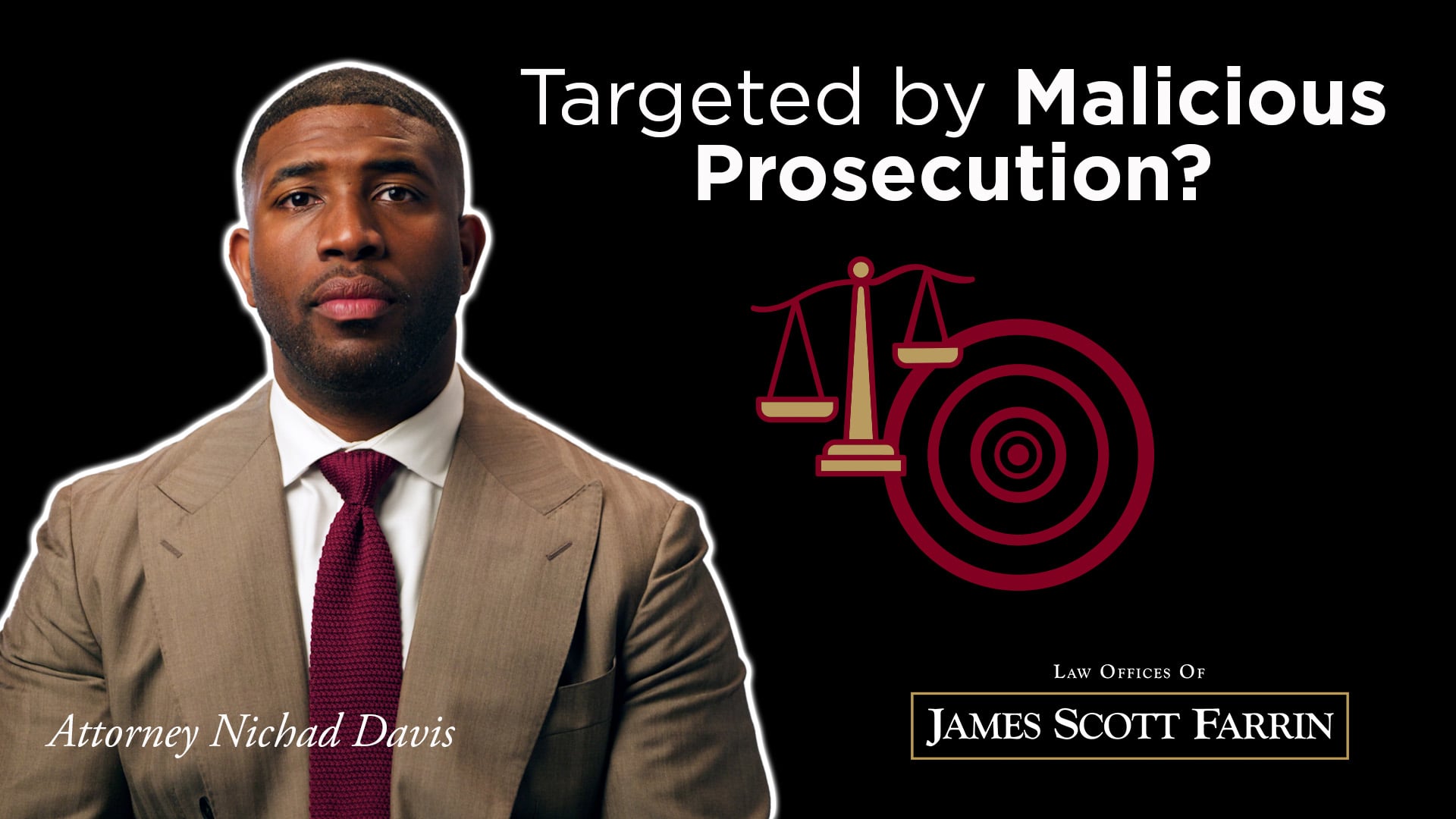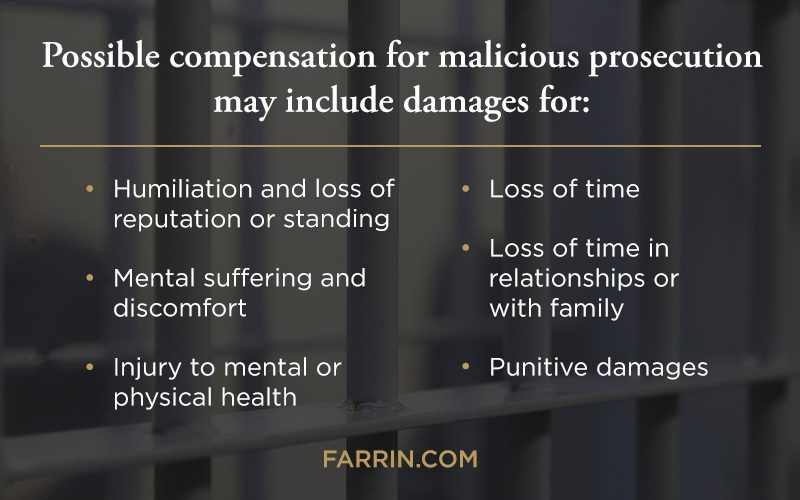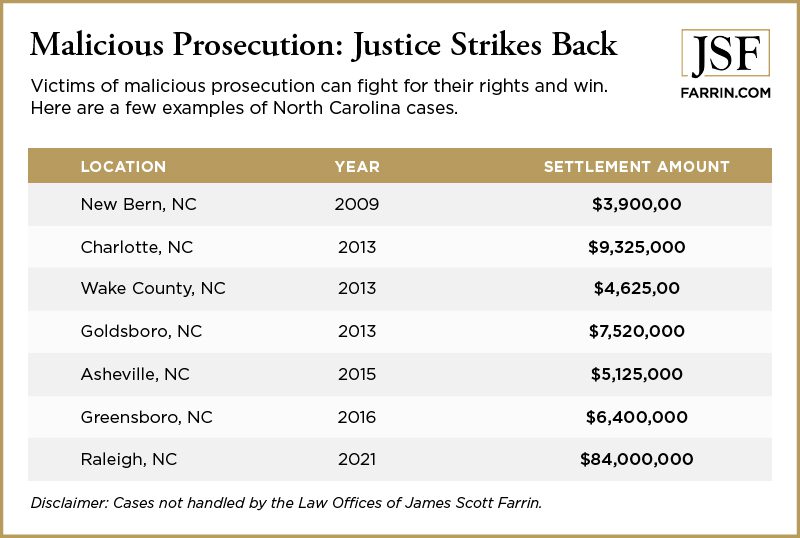Unfairly targeted for prosecution?
If someone is using the courts to harass and intimidate you, we can help you fight back.
Malicious Prosecution Lawyers Serving North and South Carolina
It’s a nightmare scenario. You are accused of or prosecuted for a crime you didn’t commit. You are innocent, and yet the wheels of justice turn against you. It’s criminal injustice.
But you are not alone.
Contact a malicious prosecution lawyer as soon as possible if you were wrongfully prosecuted or have faced injustice in the criminal justice system. Note: Malicious prosecution may apply to the government prosecuting you for a crime or a private person filing a frivolous lawsuit against you.
For a free case evaluation, call us at 1-866-900-7078 or contact us online now.
Malicious Prosecution and the Wrongfully Accused
Malicious or wrongful prosecution is the act of initiating a criminal prosecution or civil lawsuit against another party with malice and without probable cause.
To prove malicious prosecution, you must prove that four factors were present.
- Defendant Involvement: The person you’re accusing must have started or participated in the legal process against you. In other words, to be held responsible for a malicious prosecution, the person must have been involved in your prosecution in some capacity.
- Favorable Case Outcome: You must be found not guilty in a criminal case or not liable in a civil case. If you are convicted but later exonerated, you may also be able to pursue compensation for malicious prosecution.
- The prosecution must have proceeded without probable cause. This could stem from a false accusation or could have been enabled with false evidence.
- The prosecution must have acted with malice or malicious intent.
Examples of Malicious Prosecution
Many different acts might trigger a malicious prosecution case, for example:
- A prosecutor indicts you for a crime based on evidence they know is false. For example, they bring a case against you based on testimony from a witness they know is lying.
- A police officer has a personal dispute with another person and fabricates “probable cause” to arrest them.
- A former client sues you and your business for fraud when no fraud occurred.
It is important to note that someone filing a frivolous lawsuit against you doesn’t necessarily constitute malicious prosecution. You will need to prove the presence of all four factors above.
What Compensation Can I Seek for Malicious Prosecution?
Malicious prosecution takes a massive toll on its victims. While everyone is innocent until proven guilty of a crime, the accusation alone can do harm – being accused of a violent or sexual crime can destroy your life without ever going to court.
The same can be said of civil accusations. If you run a business and you’re maliciously pursued for fraud, it can create doubt in the minds of potential customers. Accusations – even unproven – can do great harm.
Malicious Prosecution and Wrongful Arrest
Malicious prosecution in a criminal case sometimes begins at the time of arrest. You may have been subjected to wrongful arrest if you were arrested with malicious intent. For example, if you were arrested based on planted or fabricated evidence, due to your race, or for an officer’s personal gain, you may have a wrongful arrest claim.
Wrongful arrest and malicious prosecution are separate violations of your rights.
Malicious Prosecution, Prosecutorial Misconduct, and False Evidence
False evidence is material or information submitted as proof in a legal matter that is untrue or misleading to influence the outcome of a case.
False or misleading evidence is often a factor in malicious prosecution cases. If the prosecuting party knows that the evidence is patently false or misleading and uses it against you, a court might find that a clear indication of malice or prosecutorial misconduct.
For example, a person may lie during testimony against you. Testimony is a form of evidence, and if the prosecution knows the testimony is false, you may have a case for malicious prosecution. Note that malicious prosecution also often involves withheld evidence – such as when a prosecutor has evidence that could prove a person innocent but refuses to consider or disclose it.
A prosecutor may also use their knowledge of the system to make your life needlessly difficult – something that may qualify as an abuse of process. Abuse of process is misuse of a legal process for an ulterior purpose, such as malicious prosecution, bad faith litigation, or frivolous legal action.
Malicious Prosecutions Lead to Wrongful Convictions
Perhaps the worst possible result of a malicious prosecution is a wrongful conviction. A wrongful conviction destroys your credibility and limits the resources you can use to fight back. Now, you must fight to try to overturn your wrongful conviction before you can sue for malicious prosecution.
In North Carolina, the law specifically provides for compensation for those who suffer due to a wrongful conviction. A similar law may come soon in South Carolina. This potential compensation is wholly separate from any compensation you seek for the malicious prosecution.
Cruel and Unusual Punishment
Whether you were subject to malicious prosecution or not, there are laws governing how detained and incarcerated people can be treated. Law enforcement and corrections officers are responsible for the treatment of prisoners. They must not abuse, or by action or inaction allow or enable the abuse of, incarcerated people.
Examples of cruel and unusual punishment can vary widely – from handcuffs being fastened far too tightly to lengthy and unwarranted stints in solitary confinement.
If you believe you, or a loved one, have suffered cruel and unusual punishment, contact a malicious prosecution lawyer immediately at 1-866-900-7078.
You May Be Entitled to Post-Conviction Relief

Note that post-conviction relief applies only to criminal defendants. If your malicious prosecution arose from a civil case where the judgment went against you, you would need to appeal the judgment with new evidence.
How a Malicious Prosecution Lawyer Helps You
Regardless of whether you suffered malicious prosecution in a civil or criminal court, malicious prosecution is a civil offense. Though a crime may have been committed in the process of malicious prosecution, only the government can try someone for a crime.
A private civil rights attorney can help you pursue maximum compensation for the harms you’ve suffered through malicious prosecution by:
- Providing objective advice and support
- Conducting research and analysis of your claim
- Investigating law enforcement recordings, reports, policies, and practices
- Filing a complaint on your behalf as needed
- Conducting evidence gathering through Discovery
- Reviewing autopsy and medical examiner reports as needed
- Seeking negotiated resolutions
- Representing you in court as needed
Call a Malicious Prosecution Lawyer for a Free Professional Opinion
If you’re the victim of a malicious prosecution, it can feel like the whole world is against you. Hiring a malicious prosecution lawyer puts someone in your corner who puts your best interests first.
You may be entitled to compensation even if the charges were dropped or the lawsuit withdrawn.
Sometimes, people don’t bring forward their malicious prosecution cases because:
- They do not know they can receive compensation for malicious prosecution
- They have other criminal charges on their record
- They fear retaliation by law enforcement
We have the experience, resources, and passion to help you no matter your situation. Don’t hesitate to seek justice.
The Law Offices of James Scott Farrin has fought for our clients’ rights since 1997. We played a leading role in recovering $1.25 billion from the U.S. government on behalf of Black farmers in one of the largest civil rights cases in U.S. history. We invested $13 million litigating just the Black farmers case – we don’t back down when things get tough.1,3
We advance all costs of fighting your case. And if we don’t recover compensation for you, you don’t pay any attorney’s fee at all. Guaranteed.2
Our attorneys, including our active trial team, are ready to fight for you against powerful foes with vast resources. If you need a malicious prosecution lawyer, don’t take chances and don’t hesitate.
Call us today at 1-866-900-7078, submit our online form, or chat with a representative right now.





